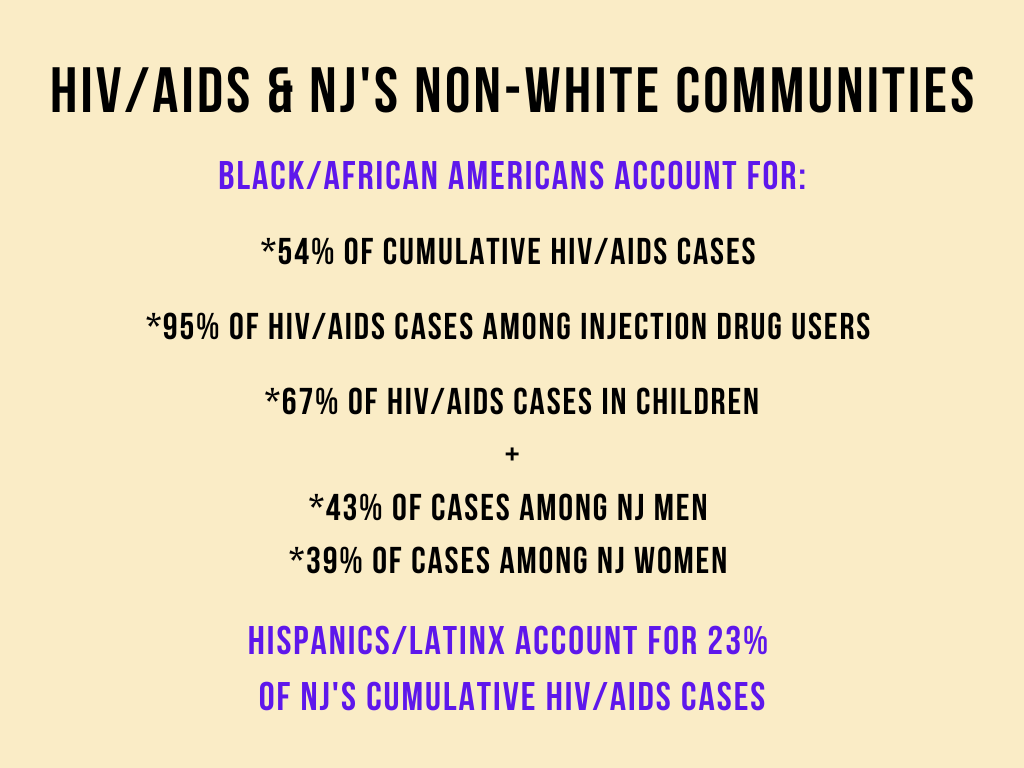HIV/AIDS: Alarming numbers for New Jersey and Essex County
Text and Statistical Curation by Victor Stolberg
Editing and Graphics by Mandy Coriston
Newark- In the four decades since the HIV/AIDS epidemic began, the disease has taken the lives of more than 750,000 Americans, part of a total of 40.1 million deaths worldwide. A 2022 estimate shows that there are currently over 1.2 million Americans living with the Human Immunodeficiency Virus (HIV), of which 13% remain undiagnosed.
For those who have been tested, underserved and marginalized communities continue to comprise the highest number of new HIV diagnoses in the United States, with LGBTQ+ men who report male-to-male sexual contact making up 68% of new cases. A racial and ethnic divide persists in new HIV diagnoses, as well, with 42% of new cases reported among the Black/African American population and 27% among those who identify as Hispanic/Latinx.
Here in New Jersey, close to New York City’s epicenter of the LGBTQ+ social and political ecosystem, the HIV/AIDS epidemic took a strong hold early and has yet to loosen its grip. New Jersey holds the seventh-place ranking of states in terms of HIV/AIDS cumulative cases reported to the U.S. Centers for Disease Control (CDC) HIV/AIDS Surveillance Data. Let’s take a look at the landscape of HIV/AIDS in New Jersey, by the numbers.
If those statistics aren’t startling enough, HIV/AIDS has been the leading cause of death in Essex County for males and females between the ages of 25 and 44 years since 1990. These numbers aren’t likely to come down until individuals begin to take responsibility for their sexual and drug-related behaviors.
HIV infection occurs mainly through sharing body fluids, such as semen, vaginal secretions, blood, and breast milk. Prevention of this transmission remains the most effective way to combat the spreading HIV/AIDS. People who are sexually active should get tested regularly and talk to each partner to learn about previous activities and partners.
AIDS remains a fatal disease without a cure. The CDC reported that 2 out of 3 people who have been diagnosed with AIDS have already died. Better treatments are available today to help slow disease progression for those who can afford the medications. People are now living longer and remaining healthier as a result, as well as holding back their HIV from mutating into AIDS. However, despite the demonstrated effectiveness of highly active antiretroviral therapy (HAART), there is an observed persistence of HIV. This persistence appears to be maintained by latency in helper T-cells. Because of this, AIDS remains a significant global health crisis.
Remember, the ONLY way to tell if you have HIV is to take a blood test that screens for antibodies. Asymptomatic carriers of HIV/AIDS can still transmit the disease, so those who engage in HIV high-risk behaviors like injection drug use and unprotected sexual activity should get tested promptly and often. In 2020 alone, the New Jersey Department of Health administered nearly 14,000 antibody tests at HIV/AIDS counseling and testing sites, including the one found at St. Michael’s Hospital in Newark. These services are free of charge. For additional information and assistance, contact the New Jersey HIV/AIDS Hotline at 1-800-624-2377.
Sources:
https://www.cdc.gov/hiv/statistics/overview/index.html
https://www.kff.org/global-health-policy/timeline/global-hivaids-timeline/
https://www.nj.gov/health/hivstdtb/hiv-aids/June2020_HIV_AIDS_Report.pdf
Mandy Coriston
Mandy Coriston is a New Jersey native writer, consultant, volunteer, and activist, who tirelessly supports food freedom, veterans’ causes, and environmental advocacy. She is a founding board member of the New Jersey Home Bakers Association, the founding coordinator of Delivering Gratitude at American Legion Post 278, and an award-winning Rutgers Certified Volunteer Master Gardener team leader. In addition to articles and op-eds published across northern New Jersey, Mandy is a prolific non-fiction and educational ghostwriter.




